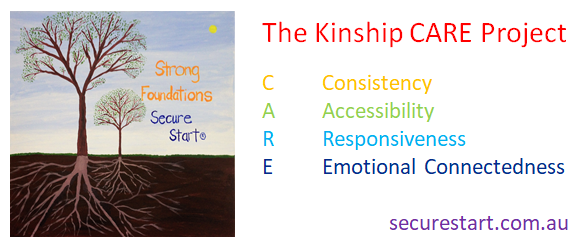Raising children who have high and/or complex needs, such as those who have developmental and medical conditions, a disability, and those who are recovering from family trauma, presents a set of stressors that can be poorly understood by others, including other family members, and leave you feeling overwhelmed and unsupported.
This is often compounded by feelings of guilt and shame about those times and situations when you don’t feel at your best and perform at your best in the caregiving role.
Raising children who have high and/or complex needs is a tough gig. It can leave you feeling like a failure. It can distort your perception of yourself and the child in your care.
It is important to consider the role and importance of wellbeing when caring for children with high and/or complex needs. In a state of wellbeing we:
- think at our best
- feel at our best
- perform at our best.
This is illustrated in the diagram below, representing Yerkes-Dodson’s Law (1908), which also shows that in a state of distress – that is, when our nervous system is too highly activated – we are incapable of performing at our best in any task or role that we undertake; including caregiving. The consequence of not performing at our best is further shame and distress, which compounds the problem.

©Colby Pearce
Achieving and maintaining a state of wellbeing when raising a child with high and/or complex needs is vital. There are many suggestions and methods about how this might be achieved, but my concern is that they often involve activities that the already overwhelmed parent or caregiver finds hard to implement. If it is hard to implement, it will not get done!
In my programs, including the Triple-A Model of Therapeutic Care and the CARE Therapeutic Framework, I favour a less demanding approach to achieving and maintaining wellbeing that is based in what we know from science about how our thinking works.
In life, we are only consciously aware of a proportion of the information that our brain registers via our sensory inputs. That is, we selectively attend to certain aspects of our experience and environment, and miss other (equally obvious) aspects of our experience and environment. This is well-demonstrated in the video below, which represents the work of Simons and Chabris (1999) on selective attention:
There is a filter at work. The filter is our thoughts. We selectively notice those aspects of our experience and environment that are consistent with our thoughts, and overlook those aspects that are not. For another example of what I am referring to, think about what happens when you buy a new car, or a coat in a certain style, or have your hair cut a certain way. You see a lot of the same car, coat or hair style; right? You also don’t notice (that is, pay attention to) cars of a different make and model, other types of coat, or other hair styles.
So, if our thoughts influence what we notice about our experience and environment, it is important to consider the following. Have a look at the image and think about what stands out for you.

When I show this to various audiences they almost always respond that the simple arithmetic equation in the bottom left hand corner is wrong. 4+4 does not equal 9. They do not comment that nine out of ten equations are right. That is, our brains appear to look for problems to solve and overlook what is right.
This is not unique to you who are caring for a child with high and/or complex needs. We all have a tendency to do this.
However, if you put this in a parenting context, where you are raising a child with high and/or complex needs you are vulnerable to noticing a lot of problems and missing the things that are going right; both in terms of your performance of the role and the gains the child is making.
This selective focus on problems to solve is unhelpful and self-defeating when raising a child with high and/or complex needs. It can leave you overwhelmed with problems to solve, thereby undermining your wellbeing and capacity to solve them. Even worse, it can also impact on how the child sees themself.
It is important to get better at noticing the things you already do that help the child with high and/or complex needs, and the signs that they are benefitting from your endeavours on their behalf. In doing so, I anticipate that you will experience feelings of wellbeing that sustain you through tough times and support your best endeavours on behalf of the child in your care with high and/or complex needs.
In the Triple-A Model of Therapeutic Care and the CARE Therapeutic Framework we support carers to pay closer attention to the things they already do that help, and the signs of progress and recovery in the children they are caring for.
For more information about our programs, or to discuss an implementation project, contact me at colby@securestart.com.au.


References:
Simons, D & Chabris, C (1999). Gorillas in Our Midst: Sustained Inattentional Blindness for Dynamic Events. Perception. 28. 1059-74.
Yerkes R.M. and Dodson J.D. (1908) The relation of strength of stimulus to rapidity of habit-formation”. Journal of Comparative Neurology and Psychology. 18: 459–482.










Pingback: A little extra consistency in tough times | Attachment and Resilience